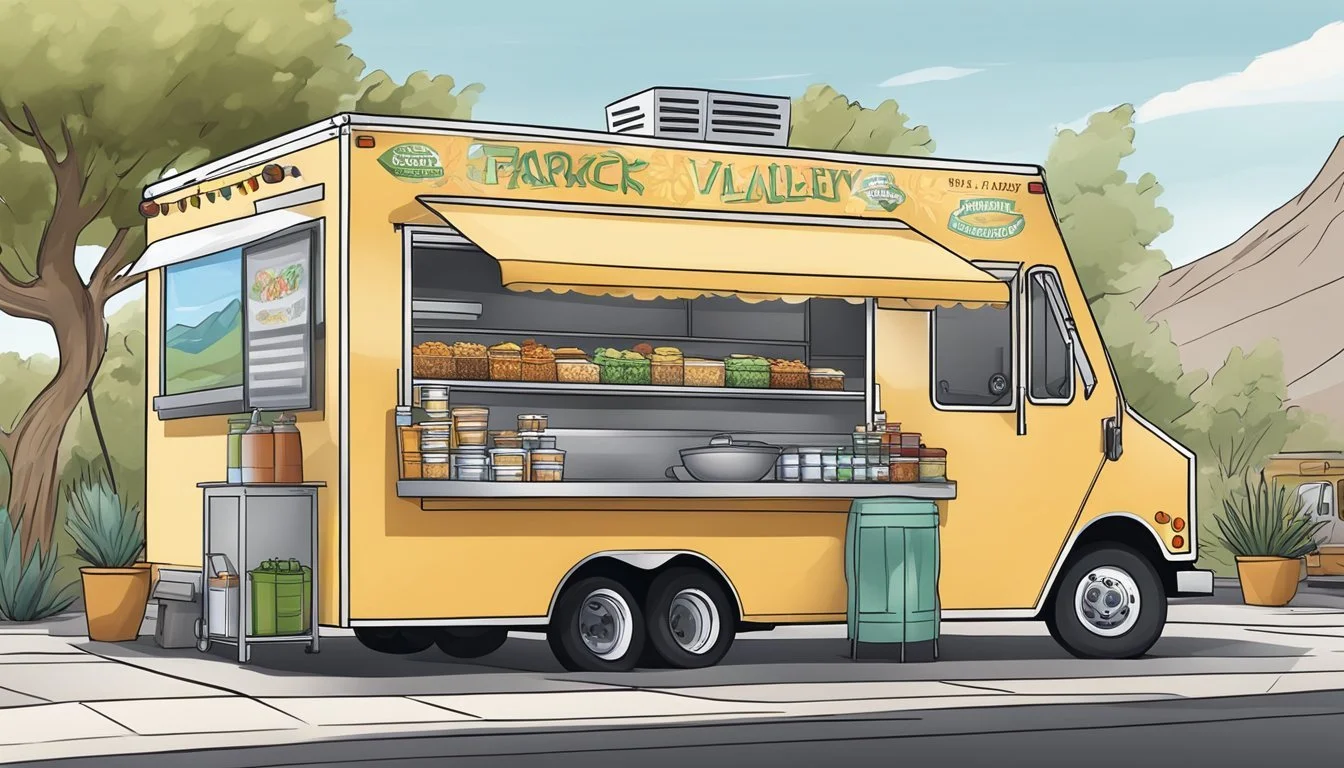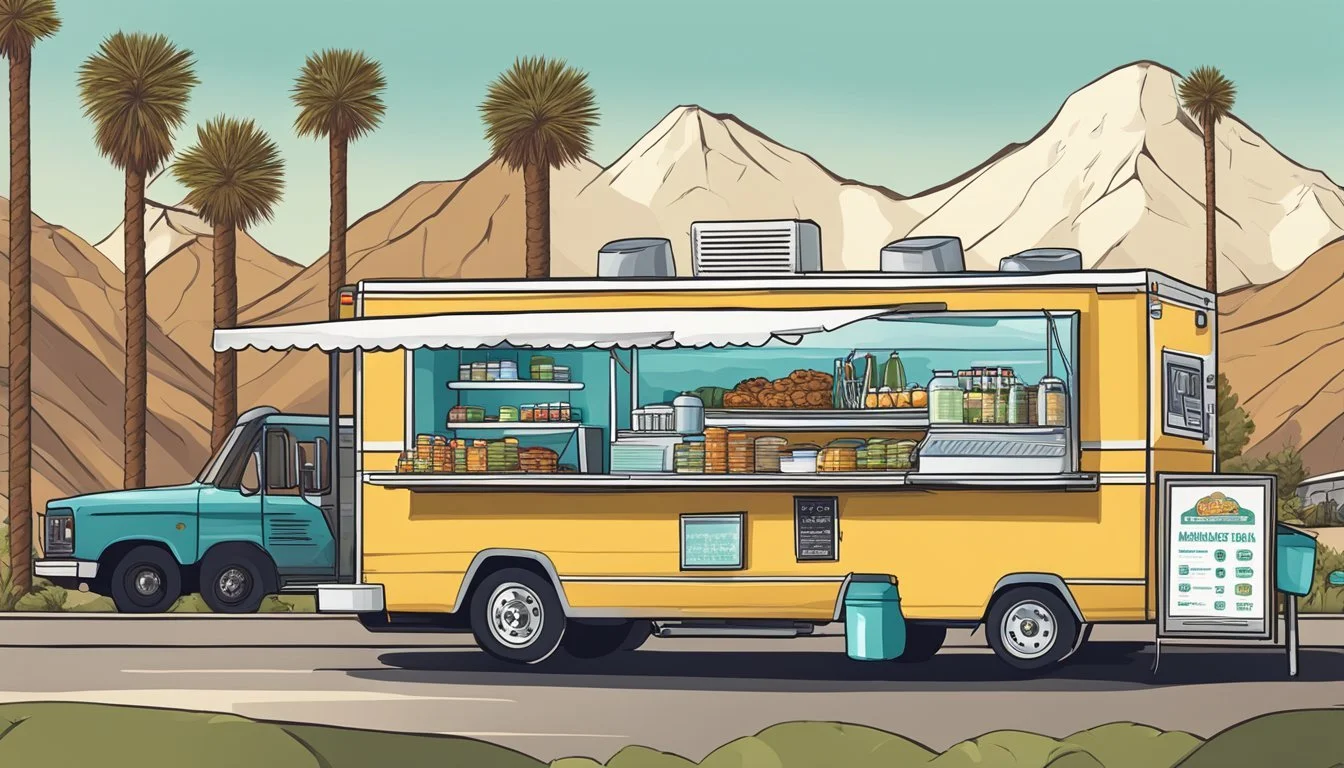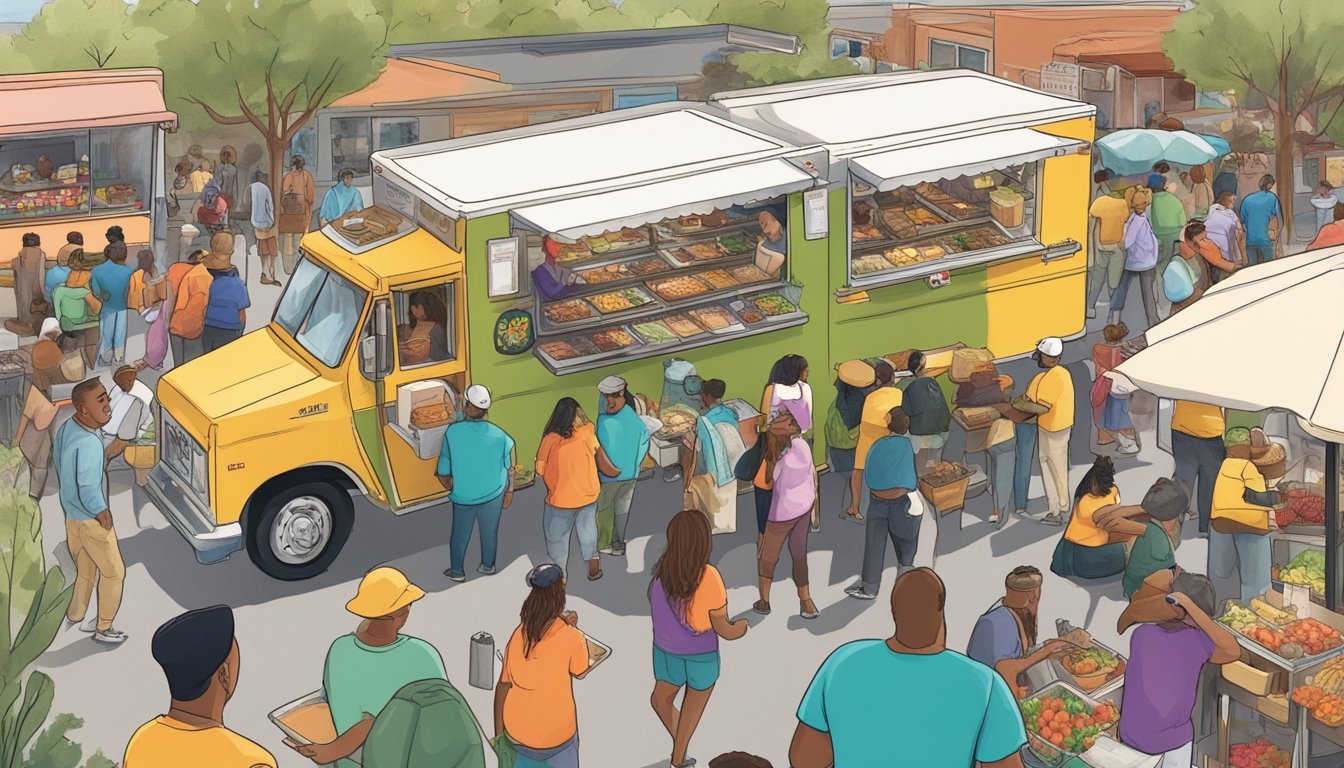Food Truck Laws Spring Valley, Nevada
A Comprehensive Guide
Operating a food truck in Spring Valley, Nevada requires navigating a series of regulations to ensure both food safety and compliance with local business ordinances. Entrepreneurs in the mobile food industry need to acquire specific licenses and permits before they can serve their culinary creations to the public. The vibrant food truck scene in Spring Valley is subject to food safety ordinances, OSHA regulations, proper waste disposal practices, and various state and local laws that govern everything from tax compliance to temperature control for food storage and preparation.
These regulations are designed to protect public health while supporting the growth of food businesses on wheels. Food trucks in Spring Valley must obtain a valid Temporary Food Establishment Permit, which allows them to operate for a specified period, usually up to 30 days. Moreover, regular inspections by the local health department are a crucial step in maintaining standards and securing the trust of customers who are drawn to the convenience and innovation that food trucks offer.
Understanding food truck laws in Nevada, including those specific to Spring Valley, is essential for mobile food vendors. Compliance ensures that food trucks can contribute to the diverse culinary landscape without interruption, allowing entrepreneurs to focus on what they do best – serving delicious food to their community. With the right information and adherence to legal requirements, food truck operators can turn their mobile eateries into successful, flourishing businesses.
Overview of Food Truck Regulations in Spring Valley
Spring Valley's vibrant food truck scene is guided by a mixture of local policies and requirements and regulations in Nevada. Food truck operators must navigate a complex landscape to maintain compliance with both state-level statutes and county-specific regulations.
State vs Local Jurisdiction
Food trucks in Spring Valley, as in the rest of Nevada, are subject to statewide health and safety regulations. These include obtaining food safety ordinances and adhering to the Nevada Administrative Code, which covers the gamut from food storage to sanitation. At the local level, Spring Valley adds another layer of requirements, such as zoning rules that dictate where food trucks may operate and for how long. It's crucial for vendors to understand that while the State of Nevada provides the overarching legal framework, the local jurisdiction can impose additional regulations or restrictions.
Key Laws and Provisions
In Nevada, food trucks must be licensed; Spring Valley enforces this mandate by requiring a business license in addition to the Nevada state health permit. The key provisions impacting food truck operators include:
Health and Safety: Compliance with the Southern Nevada Health District regulations is mandatory.
Zoning and Parking: Restrictions on locations and times for operation to avoid conflicts with established businesses and traffic.
Taxation: Proper reporting and payment of state and local taxes, facilitated by holding a Tax ID.
Inspections: Regular inspections to ensure ongoing compliance with food safety and vehicle safety standards.
Food truck entrepreneurs in Spring Valley should consistently monitor updates to laws to avoid penalties. They are encouraged to build a checklist including all necessary permits and a schedule for renewal to stay on top of their legal obligations.
Starting a Food Truck Business
When launching a food truck business in Spring Valley, Nevada, a well-structured business plan, appropriate business structure, and the necessary licenses and permits are crucial. Each step is integral to the establishment and successful operation of the venture.
Creating a Business Plan
A comprehensive business plan is the foundation of any food truck business. It not only addresses the conceptualization and financial projections but also acts as a roadmap for the entrepreneur. It should detail target markets, menu offerings, and strategies for marketing and growth. An effective plan anticipates challenges and devises solutions in advance, laying the groundwork for a successful launch and longevity in the competitive food truck scene.
Choosing a Business Structure
Deciding on the business structure is a pivotal decision for food truck owners. Options such as a sole proprietorship, partnership, limited liability company (LLC), or corporation each have differing legal and tax implications. Many opt for an LLC for its liability protection and flexibility. Consulting with an attorney can provide tailored advice to ensure the structure aligns with the owner's business goals and offers optimal protection.
Business License and Permits
Obtaining the necessary licenses and permits is a critical step and can be complex. In Spring Valley, a food truck entrepreneur must secure a business license specific to the county alongside other health-related permits. They should efficiently navigate through the process of obtaining a Food Handlers Permit, a Health Department Permit, and potentially a Fire Department Permit, depending on local regulations. Additionally, securing comprehensive insurance is imperative to protect the business from unforeseen events. It's advisable to work closely with local authorities or a specialized attorney to ensure compliance with all regulatory requirements.
Health and Safety Compliance
Food trucks in Spring Valley, Nevada, are subject to stringent health and safety regulations to protect consumers. Compliance with these regulations is mandated by the local health department, which involves acquiring a proper health permit, undergoing food safety training, and submitting to routine inspections.
Obtaining a Health Permit
Before operation, a food truck must secure a health permit from the Southern Nevada Health District. This permit indicates the food truck's adherence to the specific health codes and regulations. The application process requires a comprehensive plan review that assesses the truck's food handling, storage, waste disposal, and water supply systems.
Food Safety Training
All food handlers employed by the food truck must complete a food safety training program. The training ensures that each employee is equipped with knowledge of proper food preparation, handling, and storage practices. The training is often facilitated by the health authority to maintain a standardized level of food safety awareness among workers.
Routine Inspections
Regular inspections are conducted by the local health department to verify that food trucks remain in compliance with health codes. Inspectors evaluate several criteria, including food temperature control, cleanliness, employee hygiene, and cross-contamination prevention. Non-compliance can lead to citations, fines, or even a revocation of the health permit.
Operational Guidelines for Food Trucks
Operating a food truck in Spring Valley, Nevada, requires strict adherence to specific guidelines that ensure the safety, efficiency, and compliance with local laws. From where they set up shop to how they manage waste, food truck operators need to be vigilant and organized in their daily operations.
Location and Access
Food trucks in Spring Valley must obtain proper authorization to operate within designated zones. They must ensure that there's adequate access for consumers, avoid causing obstruction to public sidewalks, and adhere to any specific restrictions during events or within certain areas of Las Vegas. It is crucial to coordinate with local authorities for event-specific permits.
Operating Hours
The operating hours for food trucks may be influenced by local business ordinances and the region they operate in. Most areas have predefined hours during which food trucks can conduct business, and operators must abide by these regulations to maintain their license to operate. Las Vegas and its regions can have unique times, especially during special events.
Waste Disposal
Proper waste disposal practices are mandated to uphold public health laws. Food trucks must have a plan for the disposal of both solid and liquid waste and are expected to leave their location as clean as it was upon their arrival. This plan is not only crucial for environmental reasons but also plays a part in maintaining the food truck's reputation among consumers.
Food Handling and Menu Requirements
When operating a food truck in Spring Valley, Nevada, vendors must adhere to strict guidelines governing food handling and menu requirements to ensure public health and safety. The regulations address a variety of concerns, from permissible food items to labeling for packaged goods.
Permissible Foods
In Spring Valley, food trucks may offer a range of cooked foods, including but not limited to wrapped sandwiches, hot dogs, and pre-packaged shellfish. (What wine goes well with shellfish?)They are also allowed to sell whole fruits, which do not require additional preparation or handling. Food trucks must comply with regulations surrounding the cooking of items to the proper temperatures to prevent foodborne illnesses.
Labeling and Packaging
Any pre-packaged foods sold must clearly display a visible food label as outlined by the Southern Nevada Health District’s 2023 Food Regulations. The label must include:
Name of the product
Ingredients (listed in descending order by weight)
Allergens (such as nuts, soy, dairy, shellfish, wheat, fish, eggs, and sesame)
Net weight
Strict guidelines ensure that consumers are informed about what they are eating, especially when it comes to potential allergens.
Special Food Services
Food trucks that aim to offer cottage food operation services must adhere to separate, specific rules outlined by the Nevada State. It is important to note that not all homemade foods are permissible for sale, and they often cannot be potentially hazardous foods which require time and temperature control for safety.
Financial Management
In the food truck industry, financial management is not only about making profits but also involves understanding various fees, navigating costs, and handling penalties. Proper fiscal oversight is crucial for the success and legal compliance of food trucks in Spring Valley, Nevada.
Understanding Fees and Costs
Food truck operators must account for several mandatory fees which are essential for running a legally compliant business in Spring Valley. These may include:
Licensing and permit fees: Operators need to obtain permits, such as a Temporary Food Establishment Permit, which come with their own costs. They are required for a food truck to operate legally for specific periods.
Health and safety inspection fees: Regular inspections by local health departments ensure that food trucks meet public health regulations.
Operating costs: These range from ingredient purchases to fuel expenses, and they significantly affect the bottom line.
A comprehensive breakdown of the costs is vital for budgeting and financial planning. It empowers operators to forecast expenses and manage resources effectively.
Dealing with Penalties
Failing to comply with local regulations can lead to various penalties ranging from fines to the possibility of a food truck being temporarily shut down. Several misdemeanors related to public health and safety may incur financial repercussions. Operators must:
Stay informed about the latest food truck laws to avoid infringements.
Keep track of permit renewal dates, as lapsed permits may lead to operation cessation.
Food truck owners should establish a contingency fund for unanticipated fines or fees. Prompt resolution of fines often helps mitigate the risk of larger legal issues or additional financial penalties.
Community and Market Engagement
In Spring Valley, Nevada, food trucks are a vibrant part of the community and local market. They not only serve up a variety of culinary delights but also create meaningful connections with patrons and fellow businesses. Engaging with the community through participation in events and building customer relationships is crucial for success.
Participating in Local Events
Food truck owners in Spring Valley can enhance their visibility and community presence by setting up booths at local events. These can range from food truck festivals to farmers markets, offering opportunities to tap into the flow of event-goers. Engaging with events like these provides consumers with a taste of what food trucks have to offer and opens doors to collaborations with bars, restaurants, and charitable organizations.
Upcoming Events:
Spring Food Truck Fiesta: April 15, 2024
Valley Harvest Farmers Market: Every Saturday
Spring Valley Community Charity Gala: May 20, 2024
Building Customer Relations
Interactions at the window are more than transactions; they are opportunities to build lasting customer relations. Food truck operators cultivate loyalty by remembering regulars' orders, engaging in friendly conversations, and soliciting feedback. By making each consumer feel valued, food trucks create a community of enthusiasts who are likely to return and spread the word.
Customer Engagement Tips:
Get to know your customers: remember names and preferences
Gather feedback: encourage reviews and suggestions
Leverage social media: keep followers updated on locations and specials
Additional Resources
When setting up a food truck business in Spring Valley, Nevada, owners need to tap into a variety of resources for legal guidance and health-related regulations. Understanding where to find this assistance simplifies the process of complying with local laws and health standards.
Legal and Consulting Services
For legal assistance, food truck owners may consider consulting an attorney who specializes in food service and small business regulations. An attorney can provide a checklist of necessary steps and forms that need to be completed for a food truck operation. Services might include help with zoning laws, which involves interaction with the police and other municipal authorities to ensure that all business activities are conducted legally.
Health Department Resources
The local health department is a crucial resource for food truck operators. They can guide business owners through the necessary health and safety regulations that apply to mobile food vehicles, especially if the vehicle is extensively remodeled to serve food. The health department provides the required forms and can assist with understanding the specifics of food safety ordinances. They ensure that all food trucks meet the minimum requirements set by the Nevada food code.
Conclusion
In Spring Valley, Nevada, food truck operators must navigate a series of regulations to ensure their businesses are compliant with state and local laws. These regulations are designed to uphold safety standards, public health, and fair competition within the thriving food truck scene.
Operators should be aware that securing the requisite permits and licenses is mandatory. This includes obtaining a Temporary Food Establishment Permit, which is required for running a food truck. Regular inspections by the local health department are also a part of the compliance process, to guarantee adherence to food safety protocols.
It is essential for truck owners to comply with food safety ordinances, which encompass regulations on temperature control and proper waste disposal. Additionally, they must follow OSHA regulations, abide by driving regulations, and ensure taxation compliance.
The legalization of street food vending has opened doors for entrepreneurs, providing them with a clear pathway to legitimize their operations. This legislation continues to shape a more structured and regulated environment for food trucks in Nevada.
Food truck operators must maintain an up-to-date understanding of these laws to remain operational and competitive in Spring Valley's food truck territory. Keeping informed of legal changes ensures that they can adapt swiftly and seamlessly to any new requirements.










